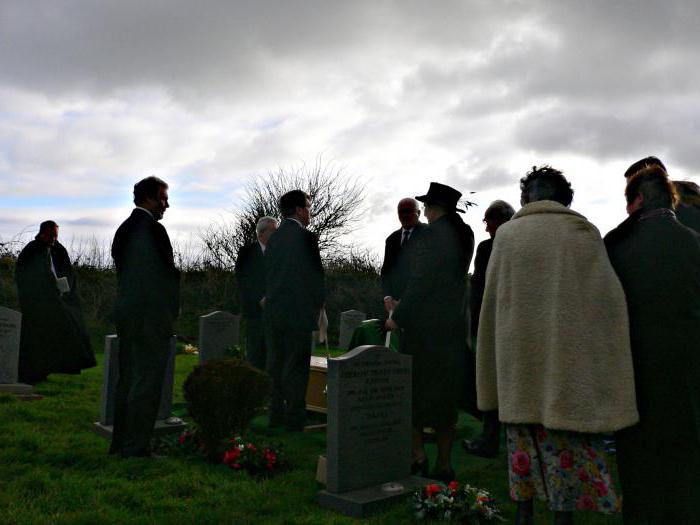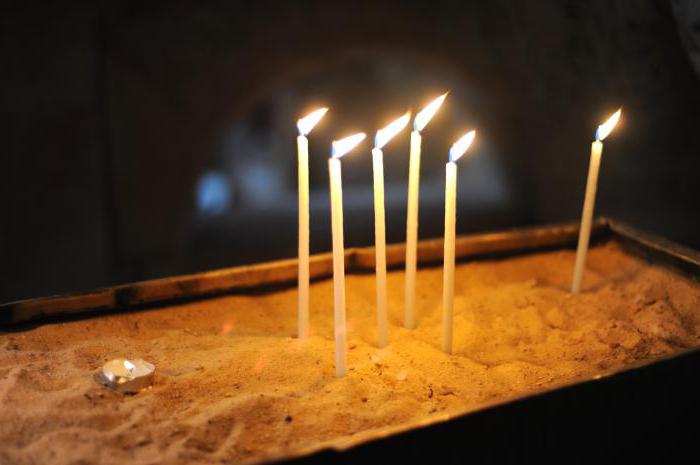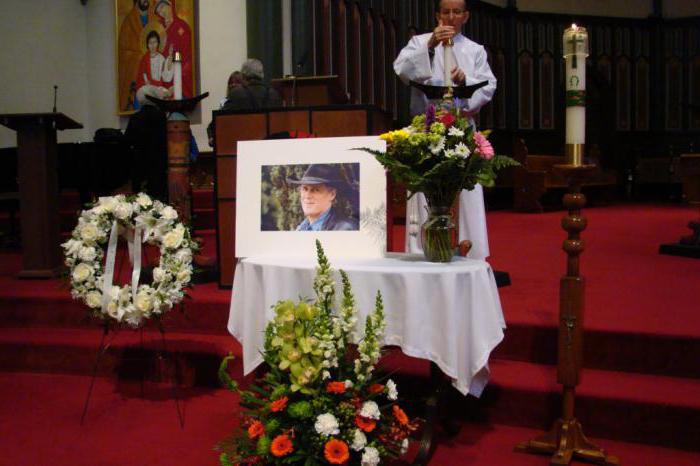40 days after death what to do. When a close relative died. What you need to do for the whole year. Traditional dishes for a funeral lunch.
Death is grief and pain for the loved ones of the deceased. Natural consolation is the desire to help, to facilitate the deceased’s transition to other facets of existence. According to the Christian religion, the 40th day is considered the most important of all memorial days, because during this period the soul says goodbye to the earth forever and leaves it. Many people organize funerals. What to say on this day and how to behave?
The Trisagion Service is a short service that is sung and performed by the priest for the deceased. The service is often performed at the following moments. Immediately after the death of a person, at home or in hospital. The evening before the funeral, at the funeral home or church.
What to do if you dream of a dead person?
You are dust and dust, you must return. On the ninth day, at the cemetery. On the fortieth day, or more often on Sunday before the fortieth day, a Memorial Service is held in the Church during the Divine Liturgy, in which the Triconnection is also sung. On the fortieth day, the family, together with the priest, goes to the cemetery to perform the Trilink.
What is the meaning of a funeral ceremony?
It is important to know that the essence of the funeral rite is to make the transition of the soul of a deceased person to another world painless, to help the soul appear before God, to feel peace and tranquility. And this is achieved through prayers. Everything that will be said about the deceased person on this day: kind words, prayers, good memories and speeches will help the soul to withstand God's judgment. Therefore, it is so important to observe all the traditions associated with this day and know
Likewise, in the third, sixth, ninth and twelve months, and annually thereafter, a Memorial Service is held in the church and in the Trisagion cemetery. In addition, all Saturdays of the year are dedicated to the Church in memory of those who have passed away, and especially the “Saturday of Souls.” The Sabbath of Souls is the Saturday before the Resurrection of the Meat and the Saturday before the Feast of Pentecost. On Saturdays, the Mnimosino shower takes place in the Church for everyone who has passed away.
At the Memorial Service, the family brings “Kollyva” to the church - that is, boiled wheat mixed with sweets such as sugar, sultans, etc. Apostolic Constitutions recommend Memorials on the third day after a person has died, representing the death of Christ and resurrection on the third day. The ninth day "as a reminder of the living and the dead" and "on the fortieth day in accordance with ancient practice" Saint Simeon of Thessaloniki interprets these important days as a Three Day Memorial that we do for the Holy Trinity, because from the Holy Trinity is our existence and our life.
The main thing on this day is to pray. You can do this yourself, or you can invite a priest.
Christian traditions for day 40
The ritual of remembrance has been known since the very beginning of Christianity. The purpose of the ritual is to give the soul of the person who has passed into another world peace and tranquility, and to help to know the eternal heavenly Kingdom.
To do this, the friends of the deceased must also gather at the funeral table. When a wake is organized for 40 days after a death, what should we say to those present? It is believed that the more people remember the deceased in their prayers, the better it will be for the soul of the person for whom they are praying. On this day, it is customary to remember moments from the life of the deceased, focusing on his virtues and good deeds.
Nine-day memorials remind us of the nine orders of the holy Angels, among which our loved one is numbered. Fortieth Day Memorial for the Ascension of our Savior. Three months, six months and nine months symbolize the Holy Trinity. "Kolyva" also has its symbolism in the church. Raw grains of wheat express faith in eternal life. Jesus said, “Unless a grain of wheat falls to the ground and dies, it will remain alone, but if it dies, it will bear much fruit.” As well as new life rises from a buried kernel of wheat, so the Church believes that the one buried will one day rise to new life in God.
Life does not stand still; if earlier the wake was held in the house of the deceased, now it can be done in a restaurant or cafe. The traditions of Orthodoxy oblige to receive more people on this day than on the 9th day, because the soul leaves the earth, and not only relatives, but also everyone who wishes to do so must say goodbye to the person.
40 days after death, wake: what to say at the cemetery?
Visiting the grave of a deceased person is an obligatory part of the funeral ritual. You need to take flowers and a candle with you. It is customary to carry a pair of flowers to a cemetery; even numbers are a symbol of life and death. Laying flowers is the most The best way show respect to the deceased.
Wheat covered with sugar and plumes to symbolize bliss eternal life in Heaven. It begins with the familiar prayer of the triagion: "Holy God, Holy Mighty, Holy Immortal, have mercy on us." Indeed, the Service is called Trisagion because it begins in this way. This is followed by a petition about the Holy Trinity and the Lord's Prayer.
Then follow several intercessions and the prayer of the Priest for forgiveness of the sins of the deceased. Then a final blessing in which we ask God to provide the remaining “rest in the bosom of Abraham, Isaac and Jacob.” Closing exclamation point: "May your memory be everlasting, our brother, worthy of being considered happy and ever remembered."
 When you arrive, you should light a candle and pray for peace of mind, then you can simply stand and be silent, remembering the good moments from the life of the deceased person.
When you arrive, you should light a candle and pray for peace of mind, then you can simply stand and be silent, remembering the good moments from the life of the deceased person.
Noisy conversations and discussions are not allowed at the cemetery; everything should take place in an atmosphere of calm and tranquility.
One might ask: why do we pray for those who have died? It is true that after death we cannot repent, a person's eternal destiny is determined immediately after death, and we cannot expect our prayers to lift an unbeliever from a state of evil and misery to a state of holiness and bliss. Why do we pray for the dead? This is because praying for the dead is an expression of love. We ask God to remember those who have passed on because we love them. Love survives death and transcends it.
We pray for those who have died just as we pray for those who live, because we are all members of Christ's church. Two parts are singled out as constituting the Church: the Church Militant and the Church Triumphant. The first includes those who are still struggling on earth and fighting the good fight of faith and godliness. The triumphal church is those who died, those who fought well and were crowned.
Commemoration on the fortieth day in the church
Church commemoration is the mention of the name of the deceased during prayer during the Liturgy for the salvation of the soul and the eternal good of the person being remembered. The ceremony is carried out after the relatives of the deceased submit a note “On repose”. It is important to know that this note contains the names only of those who were baptized in Orthodox Church.
The Church Fathers also describe the type of benefits of Memorial Services that apply to those who left their present life in repentance, or at least with a sacred desire to repent, but who may not have had the opportunity to complete it. John Chrysostom said that prayers for the dead offer them "a certain consolation." St. Cyril of Jerusalem writes about the “very great benefit” received by souls for whom the petition is made during the Divine Liturgy, when “the most amazing sacrifice” is offered.
Trembelas, in his Dogmatics, says that it has not been revealed to us “to what extent” and “to what extent” our prayers for the dead are beneficial and comforting. Prayer for the dead was, of course, practiced by the early Church. This is evidenced by works from the first few centuries. St. John Chrysostom and St. John of Damascus told us that the practice of praying for the dead was established by the apostles. These petitions for the peace and salvation of the deceased were included in the daily worship service. Even in Old Testament happened to pray for the dead.
 For the relatives of the deceased best view donations will be a candle for the deceased. At the moment of installing the candle, you need to pray for the repose of the soul, asking the Lord to forgive the voluntary and involuntary sins of the deceased person.
For the relatives of the deceased best view donations will be a candle for the deceased. At the moment of installing the candle, you need to pray for the repose of the soul, asking the Lord to forgive the voluntary and involuntary sins of the deceased person.
According to the canons of Orthodoxy, funeral services (40 days after death) are not held before the established date. If, by coincidence, it is necessary to carry out the ceremony on an earlier date, then on the next weekend after the forties, it is necessary to give out alms. A church commemoration will also be held on the same day.
To what extent our prayers for our departed loved ones bring any benefit to them, we do not know, we leave it to the mercy of God. But we are sure of one thing: such prayers benefit those who pray for the departed. They remind us that we too will die, they make us more diligent and careful in preparation for that final journey. They help us understand that so much we tend to focus on is useless. The only thing that really matters is going to Heaven and being with God.
Saint Anthony said: “If you want to be prepared to die, live every day of your life as if it were your last!” Dimitri Kokkinos Parish priest of the Resurrection of Our Lord - Kogarah. Sotirius Drapaniotis Parish Priest of Holy Cross - Wollongong.
Organization of the funeral table
 The purpose of a memorial dinner is to remember the deceased person, pray for the repose of his soul, provide psychological support to those in need, and thank people for their participation and help. You cannot organize a dinner with the goal of impressing the guests with expensive and delicious dishes, boasting of an abundance of dishes, or feeding them to their fullest.
The purpose of a memorial dinner is to remember the deceased person, pray for the repose of his soul, provide psychological support to those in need, and thank people for their participation and help. You cannot organize a dinner with the goal of impressing the guests with expensive and delicious dishes, boasting of an abundance of dishes, or feeding them to their fullest.
Why is the remembrance of the dead performed?
Sermons on the main holy days of the Orthodox Church. The funeral service, although not considered sacramental, is a special liturgical rite. The Church has special prayers for those who have “slept in the Lord.” When a person dies, the Church serves a special vigil over the lifeless body, traditionally called Parastasis or Requiem, both of which mean "hours" or "all-night vigil".
The funeral vigil has the basic form of Matins. It begins with the usual Trizagonian prayers and the chanting of Psalm 91, followed by a special Great Litany for the dead. Alleluia replaces God - it is the Lord, as in Great Lent, and leads to the singing of the funeral Troparion. The Troparion and Kontakion of the Dead, like all funeral vigil hymns, reflect on the tragedy of death and the mercy of God and ask for eternal life for the person who has fallen asleep.
The main thing is not food, but uniting in grief and supporting those who are having a hard time. It is important to take into account the main rules of Christianity: restrictions on admission alcoholic drinks, fasting and the presence of the simplest dishes on the table.
 You should not perceive a wake as a feast. Large expenses in this case are unjustified; it would be much more useful to direct financial investments into charity.
You should not perceive a wake as a feast. Large expenses in this case are unjustified; it would be much more useful to direct financial investments into charity.
Troparion Our only Creator, Who with wisdom deeply graciously commands everyone and gives everything that is useful, grants peace, Lord, to the soul of His servant, who has fallen asleep, for he trusted in You, our Creator and Modernity and our God. Kontakion With the saints, give peace, O Christ, to the soul of Your servant, where there is no more sickness and sorrow, no more sigh, no more eternal life.
Psalm 119, the verbal icon of the righteous man who has complete trust in God and complete devotion and love for his Divine Law, the verbal icon of Jesus Christ, sings to the departed with his praises and prayers for life in God. This is the same psalm that is sung over the tomb of Christ on Good Friday.
If more than 40 days have passed since the death, a wake can be arranged later, if only the funeral table will be moved. It is necessary to pray for the soul of the deceased on the 40th day.
Main dishes of the funeral table
When setting the table, it is advisable to give preference Lenten dishes. At the head of the table there should be porridge cooked from whole grains, with the addition of honey, nuts and raisins. The dish represents the rebirth of the soul and symbolizes the benefits of eternal life.
This is a psalm that sings about the victory of righteousness and life over evil and death. Accept my cause and redeem me; Give me life according to Your promise. This psalm, along with the verses and prayers that go with it, the canonical service hymns and the special funeral songs of St. John of Damascus, are all a meditation on life and death. They, in the context of the new life of the Risen Christ who reigns in the Church, are a lesson of serious instruction for those who are immune to the full tragedy of sin and its “ wages", which are death.
The composition of the dishes mainly depends on the funeral being organized. Traditionally prepared: pancakes, pies, porridge, cabbage soup and jelly. Various snacks are acceptable: salads, vegetable or Among the first courses: borscht, noodles chicken broth, beetroot. Side dish - buckwheat porridge, pilaf or puree. The Church is against alcoholic beverages; in any case, their use should be limited.
Sometimes men criticize the funeral vigil for its perceived morbidity and gloom; they say there must be more words of resurrection and life. But the vigil itself is not the Church’s “last word” on death. It is simply a solemn reflection on the tragic nature of death, its terrible reality and its power as sin and alienation from God. Awareness of these facts, especially in the modern era, so strikingly lacking, is an absolute condition for fully appreciating and celebrating the victorious resurrection of Christ and his gracious gift of eternal life to mankind.
If the wake coincided with fasting, then the meat should be exchanged for fish. For salads, vinaigrette is perfect. Let there be mushrooms, vegetables and fruits on the table. The main thing at a wake is to strengthen your strength in order to continue to tirelessly pray for the deceased.
How to prepare a funeral speech
No commemoration is complete without a funeral speech. Sometimes a presenter is invited especially for this occasion, who will help to correctly arrange the order of speeches. If the leader is absent, one of the close relatives should take on his role.
Without such preparatory meditation on death, it is doubtful whether the Christian Gospel of Life can be understood at all. Thus, it is completely ironic that the same John of Damascus who wrote the joyful canon sung by the Church on Easter night is also the author of songs of the death of the Church, which are truly uncompromising in their seriousness and uncompromising in their crudeness and realism about the inevitable fact of the final fate of the fallen human existence.
And in conclusion
What earthly sweetness remains unmixed in grief? What glory is held on earth? All things are only faint shadows, all things are the most deceiving dreams, but just one moment, and death will drive them all out. But in the light of Your face, O Christ, and in the sweetness of Your beauty, give rest to the one You have chosen, as long as You love humanity.
 When a wake is held for 40 days after a death, the words spoken at the table should be distributed in a certain order of speakers. First, the speech is given by the closest relatives, then by friends and lastly by acquaintances.
When a wake is held for 40 days after a death, the words spoken at the table should be distributed in a certain order of speakers. First, the speech is given by the closest relatives, then by friends and lastly by acquaintances.
Don't rely too much on improvisation. This is a sad event, and people who are in grief will listen to you. Brevity and accuracy are the main criteria for a funeral speech. Try to find time to practice at home so you can decide where to say nothing and what to add.
What is this mystery regarding us? Why were we brought to corruption? Why were we put to death? Truly, as it is written, by the command of God, Who gives allotted rest. As a funeral service is now usually celebrated, the Beatitudes are chanted after the canon and hymns of St. John, with prayer verses interposed between them on behalf of the dead. Reading from the Epistle of First Thessalonians. Gospel of John. The sermon is preached and the people are dismissed after they have given their "last kiss" with the singing of the last funeral song: "Memory Eternal".
Usually all the closest ones come to the wake (40 days after death). The speech given at the table should not consist of a biography of the deceased person, because there will be people who already know well all the life stages of the deceased. It is very good to talk about some fact from life that will serve as proof of the virtues of the deceased.
Traditional funeral dinner dishes
It should be noted here that this song, contrary to the general understanding of it, is a plea that God remembers the dead, for in the Bible it is the “eternal memory” of God that keeps man alive. Sheol or Hades or Pit, the biblical kingdom of the dead, also called Abaddon, is the condition of what God has forsaken and forgotten. This is a non-life situation because in such a state no one can praise the Lord; And praise to the Lord is the only content and purpose of human life; This is the very reason for its existence. Thus, this most famous and final of Orthodox funeral hymns is a prayer that the departed will live forever in the "eternal rest" of the "eternal memory" of God; All this is made possible and actual by the resurrection of Jesus Christ, which is the destruction of the Pit of Death through the splendor of Divine Righteousness and Life.
When preparing a wake for 40 days after a death, poems dedicated to the mourning event can be more useful than ever. They will help you tune in to a lyrical-tragic mood, helping to create an atmosphere of a wake.
You can supplement your speech with a photograph of the deceased or an item that belonged to him, which will prove to those present how a good man was deceased. Avoid mentioning the deceased's mistakes, gossip and secrets. There is no place for such speeches at the funeral table.
Sample speech
Many people think when they organize a wake for 40 days after a death: “What to say?”... There is no established version of such a speech. The most important thing is to say the words from the heart. But there are still certain rules, using which you can prepare and speak correctly during the funeral ceremony.
 You should begin by greeting those present, followed by a story about who you are to the deceased. Say a few words about mourning and then move on to talk about the good aspects of the person being remembered. If possible, remember the good moments you experienced together. It is very appropriate to involve other people in the memories so that your story is complemented by good memories. The speech ends with a promise to forever remember the one being remembered.
You should begin by greeting those present, followed by a story about who you are to the deceased. Say a few words about mourning and then move on to talk about the good aspects of the person being remembered. If possible, remember the good moments you experienced together. It is very appropriate to involve other people in the memories so that your story is complemented by good memories. The speech ends with a promise to forever remember the one being remembered.
Still, you can remember a deceased person whenever you want. The main thing is to follow the basic rules of the memorial rite: prayer, alms and good memories of the deceased.



















